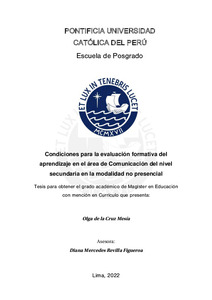| dc.contributor.advisor | Revilla Figueroa, Diana Mercedes | |
| dc.contributor.author | De la Cruz Mesía, Olga | |
| dc.date.accessioned | 2022-06-09T21:58:11Z | |
| dc.date.available | 2022-06-09T21:58:11Z | |
| dc.date.created | 2022 | |
| dc.date.issued | 2022-06-09 | |
| dc.identifier.uri | http://hdl.handle.net/20.500.12404/22571 | |
| dc.description.abstract | El proceso de evaluación formativa requiere de ciertas condiciones para
ejecutarla; es decir, aquellas situaciones, aspectos o circunstancias que
dependen del docente y del estudiante, con el fin de mejorar y lograr efectividad
en los aprendizajes.
La pregunta de investigación es: ¿Cuáles son las condiciones para desarrollar la
evaluación formativa del aprendizaje en el área de Comunicación del nivel
secundaria en la modalidad no presencial en una institución educativa pública
del distrito de Independencia de Lima? Y como objetivo general: describir las
condiciones para el desarrollo de la evaluación formativa del aprendizaje en el
área de Comunicación del nivel secundaria en la modalidad no presencial en una
institución educativa pública del distrito de Independencia.
La investigación es cualitativa, nivel exploratorio y utilizó el método de estudio de
caso único. Para recoger información se aplicó la entrevista semiestructurada
individual a siete docentes del área de Comunicación de una institución
educativa pública de Lima. El análisis de datos comprendió procesos de
codificación y categorización y se aplicó la suma categórica.
Se destaca en los resultados que para las docentes entrevistadas la evaluación
formativa exige cuidar algunas situaciones o condiciones que favorezcan su uso.
Entre las condiciones que ellas reconocen se tiene la planificación que les
permite ajustar los procesos de enseñanza y aprendizaje a las características,
necesidades y demandas de aprendizajes de los estudiantes; la selección
adecuada de técnicas e instrumentos de evaluación para recoger información,
así como prever y ejecutar el proceso de retroalimentación para identificar
fortalezas y dificultades en el aprendizaje de los estudiantes. Además, ellas
reconocen la importancia de la participación activa y el compromiso de los
estudiantes en ese proceso, porque les permitirá tomar decisiones oportunas;
así como asumir compromisos con la mejora de su propio aprendizaje. | es_ES |
| dc.description.abstract | The process of formative assessment requires certain conditions under which to
be applied; that is, those situations, aspects or circumstances that depend on the
teacher and the student, which aim at improving and achieving effectiveness in
learning.
The research question is: What are the conditions under which to develop
formative assessment of the learning process in the area of Communication at
high school level in (online) distance courses in a public school in the district of
Independencia in Lima? And the main objective is: to describe the conditions that
promote the development of formative assessment of the learning process in the
area of Communication at high school level in (online) distance courses in a
public school in the district of Independencia. This is qualitative research, at an
exploratory level and the single case study method was used. Individual semi structured interviews were used to gather information from seven schoolteachers
in the area of communication in a public school in Lima. The analysis of the data
included coding and categorizing processes and, the coproduct (categorical sum)
was used.
From the findings, it is highlighted that for the interviewed teachers, formative
assessment demands taking care of certain situation or conditions which boost
its use. Among these, teachers pointed out planning, which allows them to adjust
the teaching and learning processes to the characteristics, needs and demands
of their students; the appropriate selection of assessment techniques and
instruments to gather information, and: moreover, foreseeing and carrying out the
feedback process to identify strengths and weaknesses in the students’ learning
process. Furthermore, teachers acknowledge the importance of active
participation and students’ commitment in the process since this will let learners
take timely decisions, as well as take on new responsibilities in the improvement
of their own learning process. | es_ES |
| dc.language.iso | spa | es_ES |
| dc.publisher | Pontificia Universidad Católica del Perú | es_ES |
| dc.rights | info:eu-repo/semantics/openAccess | es_ES |
| dc.rights.uri | http://creativecommons.org/licenses/by-sa/2.5/pe/ | * |
| dc.subject | Comunicación--Estudio y enseñanza (Secundaria) | es_ES |
| dc.subject | Planificación curricular | es_ES |
| dc.subject | Evaluación educacional | es_ES |
| dc.title | Condiciones para la evaluación formativa del aprendizaje en el área de Comunicación del nivel secundaria en la modalidad no presencial | es_ES |
| dc.type | info:eu-repo/semantics/masterThesis | es_ES |
| thesis.degree.name | Maestro en Educación con mención en Currículo | es_ES |
| thesis.degree.level | Maestría | es_ES |
| thesis.degree.grantor | Pontificia Universidad Católica del Perú. Escuela de Posgrado | es_ES |
| thesis.degree.discipline | Educación con mención en Currículo | es_ES |
| renati.advisor.dni | 07655540 | |
| renati.advisor.orcid | https://orcid.org/0000-0002-6099-0064 | es_ES |
| renati.author.dni | 19322763 | |
| renati.discipline | 191327 | es_ES |
| renati.juror | Escobar Cáceres, Patricia María | es_ES |
| renati.juror | Revilla Figueroa, Diana Mercedes | es_ES |
| renati.juror | Briceño Vela, Dany Marisol | es_ES |
| renati.level | https://purl.org/pe-repo/renati/level#maestro | es_ES |
| renati.type | https://purl.org/pe-repo/renati/type#tesis | es_ES |
| dc.publisher.country | PE | es_ES |
| dc.subject.ocde | https://purl.org/pe-repo/ocde/ford#5.03.01 | es_ES |






